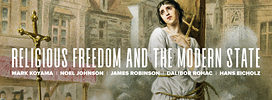We thank Dalibor Rohac for his insightful commentary. He is correct in noting that mass killings can result both from the actions of large and powerful states like Maoist China or Stalin’s Soviet Union, and in the absence of a state.
Dalibor’s main substantive point concerns the importance of federalism. The promise of federalism—as outlined in Barry Weingast’s important work on market-preserving federalism—is that a federal state can obtain the best features of both centralization and decentralization. A federal state benefits from economies of scale and a large internal market while benefiting from decentralization at a local level.
We do not disagree with Dalibor on the prospective benefits of federalism. One message of Persecution and Toleration is that the historical process through which state formation takes place matters. In Britain and France the state building process resulted in highly centralized nation states. In Germany this process did not take place. When Germany was finally unified in the 19th century it was as a federal state. As a large part of our argument is focused on the rise of modern states in Western Europe, we did not dwell on federalism at any great length.
Moreover, the extent to which federalism will safeguard personal, social, and economic liberties depends on the character of the federal state. The Holy Roman Empire was a federal structure, but it did not safeguard individual liberties. In particular, our reading of the evidence suggests that it is critical that the federal state is market-preserving and that it enforces general rules.

